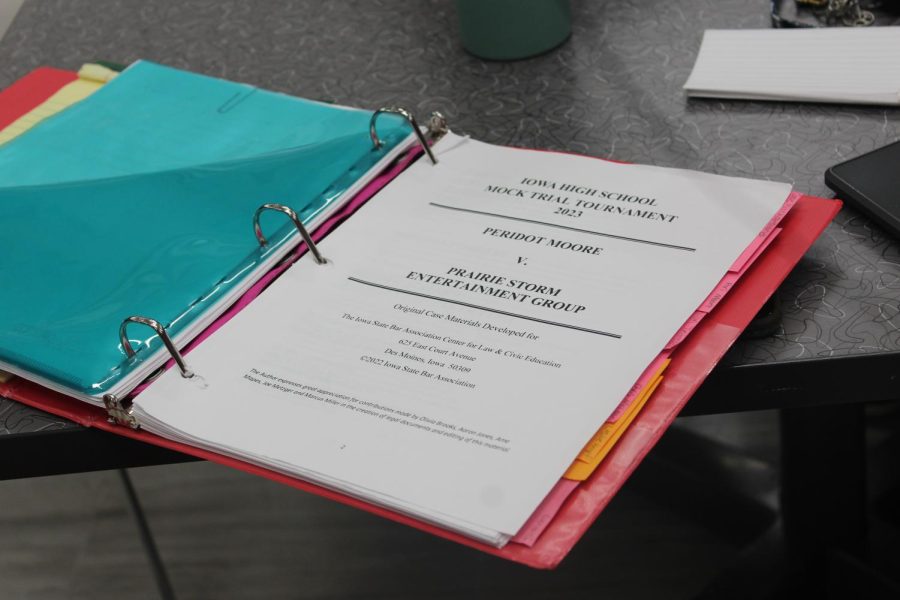An Under the Radar Activity: Mock Trial
A binder filled with Mock Trial materials lays on the table to be referenced during a meeting. Every student has a booklet like this one that has all of the information needed about the case, exhibits, and witnesses. This student highlighted, marked up, and used sticky notes to organize the trial notes.
February 28, 2023
Starting in January, aspiring lawyers and students with a passion for debate and community join forces for Mock Trial. With an attorney for a coach and returning students to help teach the newbies, the team prepares a trial for competition.
The trial this year consists of Peridot Moore suing Prairie Storm Entertainment Group over allegations relating to their disqualification from the Group’s TV show. The defense for the Prairie Storm Entertainment Group must say that Moore did have a fair chance in the show, while the plaintiff (the side who brought the case to trial) for Moore argues that they did not.
There are eight members on the team, just in the range of the required 8-10 members (and two alternates). The team members are seniors Lucas Neppl and Celia Kreifels, juniors Kaylin Dains and Emma Ostrem, sophomores Carmen Schwalen, Emmett Clarke, and Annelise Kreifels, and freshman Sariah Scott.
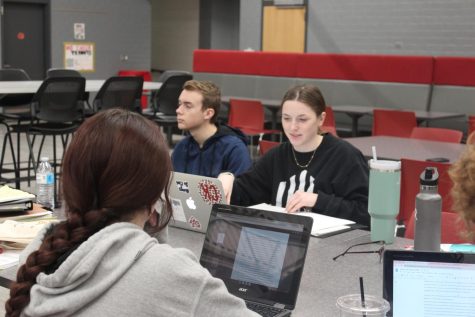
Many of the mock trialers have to perform multiple parts in the trial.
Schwalen, for example, is a plaintiff and a defense attorney. She will present her witnesses and ask the opposing team’s witnesses questions. For her first year in mock trial, Schwalen said “it’s pretty nerve-wracking” to have two attorney roles, but said, “it’s super cool. I’m excited.”
Ostrem and Scott are witnesses and Scott is a timekeeper as well. As a witness, their job is to embody their character to be able to answer the attorneys’ questions during the direct and cross-examinations. A timekeeper keeps track of the time and holds up time cards to inform the judge and the teams of the time remaining in each part of the trial.
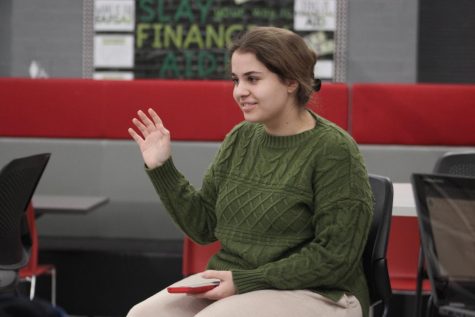
During the competition day, ADM will go to trial twice. For one of the trials, the team will be the defense and for the other trial the team will be the plaintiff.
Competing against another school, the students will present their side with an opening statement in 4 minutes, a direct examination for 25 minutes, a cross-examination for 20 minutes, and a closing statement of 8 minutes. An entire trial takes 57 minutes.
Although both teams know what evidence and arguments could be brought up, Schwalen said “you have to pretend like you don’t know.”
Points are awarded to teams based on “how clearly and concisely the witnesses’ attorneys communicate with each other . . . follow[ing] proper rules and procedures” when introducing exhibits (evidence) and witnesses, fitting in the allotted time, and the reasons for an objection and an attorney’s response to the objection, said Stephen Brown, the team’s coach.
During practices, the attorneys prepare questions, while the witnesses prepare to be asked many different questions. Scott described their practices as self-paced with “individual and partner work.”
As the competition approaches, they do mock direct- and cross-examinations like how it will look at the mock trial competition, getting used to the formalities and flow and refining their questions and answers.
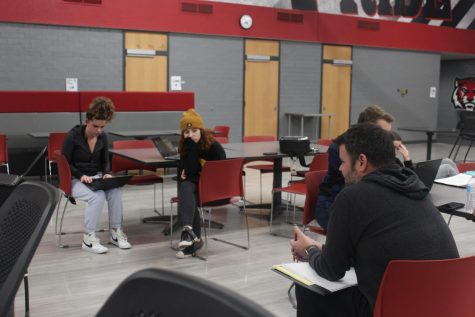
Personally preparing for the trial means the students take time outside of the once-a-week Tuesday team practices to go over the material and case. All the case information is in a thick packet. Each student will look over the provided background information on their role.
The better each person knows their job, the better the team will do when the competition rolls around. “Most of the work happens outside of practices,” said Ostrem. As witnesses, Ostrem and Scott read and memorize their witness statements to know their character inside and out.
As an attorney, Schwalen said she memorizes “everyone’s roles and then [makes sure I’m] feeling confident in what questions I need to ask and how I need to ask them.”
Some of the students on Mock Trial are not thinking about going into law after high school, but Schwalen is not one of them. Her enthusiasm for Mock Trial comes from a genuine interest in law and a desire to become a lawyer. “This probably makes me want to be a lawyer more now,” she said. Scott is another student who is considering law.
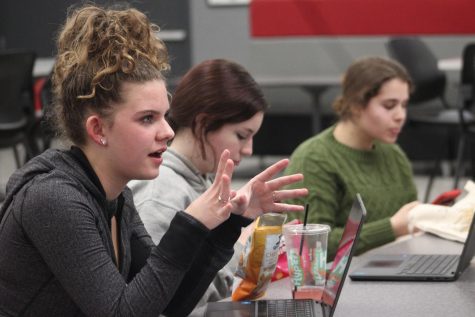
According to Ostrem, Scott, and Schwalen, mock trial is fun because of the community that’s made with the people. Ostrem also said, “Reading about the cases is kind of cool, cause they’re like a completely made-up case, but it seems like a real case.”
Their coach has similar thoughts about the group. Brown said he takes time out of his week, “Because of who these students are. They’re all great, I’ve really enjoyed every student I’ve had, both last year and this year and I enjoy the teaching aspect, if I wasn’t an attorney, I would like to be a teacher. And it gives me an opportunity to give back, hopefully they learn and enjoy this process and I know I do. It’s great to see from the first day of practice to the day of the competition how much they learn and just learning about the students and seeing all the hard work and how it pays off.”
Both Ostrem and Scott said it is an activity that looks good on college applications by indicating the numerous skills that these students have gained and practiced: responsibility, staying on top of work, and memorization. Brown added teamwork, organization, listening, preparation, and reliance on others to the list as more skills that the team does in mock trial.
These skills can be taken with them out into the world and in their day-to-day lives.
Overall, the mock trial process and experience provide members with knowledge of how a courtroom works and of law.
Mock Trial’s competition is Tuesday, March 7th at 8:30 am and 1:30 pm at the Iowa Events Center in Des Moines.



